- Home
- Colleen Gleason
The Clockwork Scarab: A Stoker & Holmes Novel Page 3
The Clockwork Scarab: A Stoker & Holmes Novel Read online
Page 3
Over the unbuttoned shirt, the intruder wore a jacket of black leather that was much shorter than any other coat I’d seen, ending just at his waist instead of halfway to the knees. The hem of the plaid shirt hung below it. His trousers were just as unfamiliar—made of dark blue denim, like the Levi Strauss pants worn by American laborers. They were frayed a little at the hems and worn in the knees.
And his shoes! I wanted to crouch and examine them, for I couldn’t identify the material from which they were made. They laced up the front like a woman’s shoe, but without the tiny little buttons that took forever to hook. (My mechanized Shoe-Fastener had broken three weeks ago.) Gray with age, yet decorated with an odd swoop-like design on the sides, they looked as if they were made of rubber.
Despite being worn, his footwear was not blood- or mud-splattered, which was curious because it had been raining today—as was usual for London. It would have been impossible to avoid the muck outside, even on the upper streetwalk levels.
He’d not been outside today.
Curious.
Had he been hiding in the museum since before it had begun to rain at dawn? My eyes narrowed in thought and I exchanged glances with Miss Stoker. I didn’t expect her to have followed my train of thought—after all, one must be a trained observer, my uncle always said—but nevertheless, I saw intelligent question in her gaze.
“You claim you didn’t move her, that you were trying to help her. But what are you doing here in the museum, in the middle of the night?” I asked.
“I’m—uh—I’m part of the custodial staff,” he said. “We were going to wax the floors.” His smile was forced, yet I couldn’t help but appreciate the attempt at an explanation, regardless of how implausible it was.
“That’s absurd,” said Miss Stoker. The gun wavered in her hand.
“What? The waxing? Hey, it needs to be done—” He must have noticed my severe expression, for he changed his tack. “Look, I swear I didn’t touch her. I just found her lying here. I know I shouldn’t be here at night, but it wasn’t exactly my fault. Circumstances beyond my control. Really freaking odd circumstances.”
“You can explain all of these—erm—odd circumstances to the authorities when they arrive,” I said. “But you needn’t worry about being arrested for murder. I can attest to the fact that you’re innocent of that, at least.”
“Well, thank goodness you figured that out,” he said, his voice dripping with insincerity.
With a little sniff, I returned to the victim, leaving Miss Stoker to deal with the intruder. It was imperative that I finish my examination before the authorities arrived and disturbed everything.
Face, jaw, and fingers beginning to stiffen—rigor mortis in early stages; dead at least three hours, possibly four or five.
Steeling myself for my first good look at her, I turned the girl onto her back. I couldn’t hold back a little shudder. Her sightless eyes stared up into the high ceiling of the gallery. With a catch of breath, I closed them with two fingers, hoping she’d found peace without too much pain first.
Blood stained the front of her shirtwaist and her left sleeve, but only a bit on her right. Slender burn-like marks around her arms, as if a thin cord or wire had been wrapped around them. And a terrible slash along her left wrist. I sniffed her hair. Opium. Faint but unmistakable.
Too little blood on the left sleeve—no splashes of blood on the arm that made the cut? Impossible to be self-inflicted.
“Miss Stoker. Do you recognize this young woman?”
Before she could respond, I heard the sound of approaching footsteps. More than one pair, so it would seem Miss Adler had not only rung for the authorities, but fetched them as well. “Hurry,” I said as Miss Stoker moved toward me, still holding the gun pointed at our intruder.
She swallowed audibly. “Yes, I believe that’s one of the Ho—”
Whatever she was about to say was cut off by a loud, strange sound. It was perhaps a sort of music, but it was like nothing I’d ever heard before. I spun on my haunches and saw a small silver object sliding across the floor. A colorful light shone from its flat top and the sound—loud, screeching, vibrating—seemed to be coming from it. Miss Stoker jumped out of the way just as one of the large stone statues at the edge of the gallery teetered and began to fall.
“Look out!” I shouted as the bristly-haired stone satyr crashed to the floor.
“Stop there!” ordered a commanding voice as two men and Miss Adler came rushing around the corner from the Roman Gallery.
“He’s gone!” hissed Miss Stoker, who still held Miss Adler’s gun and was now next to me. She was pointing to where the young man had been moments ago.
Ignoring the shouts from the new arrivals, we dashed over to where the intruder had been standing. Having either taken advantage of or manufactured the distraction, he had slipped into the dark shadows.
“I’ll go after him,” said Miss Stoker, starting off, but a voice ordered, “You! Miss! Stop there!”
“Drat,” I muttered, snatching up the silver object that had presumably belonged to the intruder. Clever to use it as a distraction for us, and convenient that he’d left it behind.
The smooth, flat device had gone silent and dark by now. I shoved it in my trouser pocket to examine later, hoping it wouldn’t start screeching again. I turned at last to greet Miss Adler and the two gentlemen: Scotland Yard inspectors. They were out of breath from running along the gallery.
“Ladies, this is Inspector Luckworth.” Miss Adler gestured to the older of the two men.
About forty, Luckworth was a man of average height and a spare amount of hair, except for the neat beard and mustache that hid his lips. I gave him a brief examination.
Misbuttoned jacket, shirt half untucked, mismatched boots—dressed hurriedly in dark, likely to keep from waking wife.
Tarnished wedding ring, tight but removable—married at least three years; enjoying wife’s home cooking.
Small fingerprints just above the knee and a swipe of dried milk on the front of his trousers—toddler in the household.
The faint shift of gears and quiet rumble—mechanized left leg, overdue for oiling.
“Miss Adler.” Luckworth’s voice was less friendly than hers had been. “Who are these girls? And what are they doing here at this time of night? What are you doing here at this hour? And how did that happen?” He gestured to the rubble that had once been the stone satyr.
Miss Stoker and I exchanged glances at his remark, which made it sound as if we were schoolchildren.
“I’ve been engaged by the museum to catalog its unorganized antiquities acquired over the last three decades, Inspector,” Miss Adler replied. “I’m certain you are aware of that.”
“Yes, and I still find it inconceivable that the director selected you to do so.”
“Unfortunately, that opinion is not relevant to our current tragedy,” Miss Adler pointed out with a cool smile.
The younger inspector, who couldn’t have been more than a few years older than I, rose from his examination of the girl’s body. “Right. Regardless, madam, that doesn’t explain your presence here at”—he paused to flip open an elaborate pocket watch that had four small folding doors and, once open, rose into a complicated three-dimensional timepiece arrayed with buttons—“twelve forty-three in the morning.” He pushed a button and the clock folded back into place with soft, pleasant clicks.
Miss Adler’s smile turned gentle. “But of course it does. There is no limitation on my work schedule. Sir Franks has given me access to the museum at any and all hours of the day. You of all people, Inspector . . . ?”
“Grayling,” the young man replied. “Ambrose Grayling.”
“Inspector Grayling, you and your colleague should well understand that there are certain occupations which are not regimented. One works whenever one must. Even in the dead of night.” She made a smooth gesture with her hand. “Perhaps we could quibble about my employment restrictions later. I rang Scotland
Yard because we have a crime to investigate, and I’m certain the two of you would like to get to work before more time has passed.”
“We have a crime to investigate?” said Luckworth. He laughed. “Miss Adler, there is no ‘we’ about it. You and your companions will give your statements and leave the investigation to us.”
“But I beg to differ, Inspector—with all due respect,” Miss Adler added in a sugar-coated voice, “we have already begun the investigation.”
I took this as my cue to step forward. “I have already begun a preliminary examination of the body. If you wish, I shall enlighten you with my conclusion—”
“Pardon me,” said Inspector Grayling in a flat voice that carried a bit of the Scottish. It was no surprise, for it matched the dark copper color of his thick, curling hair.
I turned my full attention on him, aware that he was a rather attractive young man. He had a freckled complexion over tanned skin; however, the freckles did nothing to make him look boyish or innocent. Instead they gave a pleasantly ruddy cast to his square jaw and prominent nose.
Unevenly stubbled chin and tiny cut near left ear—needs to sharpen his razor and is impatient in character.
Cuts and scrapes as well as a large blister adorned his left, pencil-holding digit—doesn’t wear gloves, works hard but not without haste and clumsiness.
No wedding ring and one button dangling from jacket cuff—unmarried and lives in a household without females.
Jacket cuffs frayed, short for his elegant wrists, two years out of style—handed down clothing, not of upper class.
Ornate, complicated pocket watch but wears used clothing—an utter cognoggin; more concerned with his gadgets and devices than personal appearance.
Grayling was saying, “This is no concern for a civilian. Now, if you—”
“Inspector Luckworth and Inspector Grayling,” interrupted Miss Adler, “may I introduce Miss Mina Holmes?”
Both of the gentlemen turned to me, and if I weren’t so shocked at being back in the spotlight, I might have found their expressions comical. Luckworth looked as if he’d swallowed a biscuit whole, and Grayling lifted his Scottish nose as if he smelled haggis gone bad. (Incidentally, I am of the opinion that haggis is always bad.)
“I daresay—” Luckworth began, but his younger colleague interrupted, “Holmes? You don’t expect us to believe—”
“I am the niece of Sherlock and the daughter of Sir Mycroft. Ponderous appellations and high powers of deductive reasoning run as rampant in my family as the pox does in Haymarket.” I wasn’t certain from where I dredged up such confidence, but the words tripped from my tongue.
“I can’t imagine how a young lady such as yourself would be familiar with the curse of Haymarket.” Grayling cast me a cool gray-green look that threatened to bring a warm flush to my cheeks. “But regardless of your name, Miss Holmes, which I will accept as proof of your relation to the esteemed Misters Holmes, your assistance is unnecessary. Inspector Luckworth and I are well trained and able to do our jobs without interference by a fe—civilian.”
“Very well,” I said, lifting my nose. “Carry on.” At that moment, I wished I had a skirt hem to snatch up for a bit of feminine emphasis in my vexation. His expression made me prickle: supercilious yet polite.
But my new mentor wasn’t about to be cowed. “We won’t be leaving until we’ve completed our own investigation.” Miss Adler gave me an affirming nod that meant I should continue with my work. I sidled away from the cluster of people.
“Your investigation?” Luckworth choked as I knelt next to the dead girl. “This is not tea time, Miss Adler. Nor is it a woman’s salon nor even a ruddy—’scuse me—suffragette meeting. This is the scene of a crime, and only the investigators will remain.”
Swallowing hard, I searched through the pockets in the victim’s voluminous skirts as Miss Adler responded to the inspector in her low, even tones. It wasn’t that I expected to find something as obvious as a Sekhmet scarab, but anything could be a clue. She wore no jewelry except for a comb of topazes in her dark hair, and her gloves were missing.
“Her Royal Highness has authorized you to—” Luckworth bit off his own words as if to keep from saying something regretful.
As the discussion (I use that term loosely) raged between the inspector and Miss Adler, I used my hand-cranked Flip-Illuminator to examine the wound on the girl’s arm. When he noticed, Grayling made a sharp sound and stalked over to me. This placed his shoes in my field of vision—right next to my legs, where I crouched in voluminous trousers, and I noticed that his footwear gleamed in the mellow light except near the soles where they were speckled with mud. That reminded me of the foreigner and his mud-free shoes. Was he still in the museum?
“Miss Holmes, this is the scene of a crime,” Grayling said in a tone that indicated clear displeasure.
“I’m aware of that. I’m making my observations and deductions. Shall we compare notes?”
He looked down at me, and the light from my small illuminator shone in his eyes. They were still spots of exasperation, spoiling an otherwise pleasing countenance. “If you feel it necessary to share your information with us, I cannot stop you, Miss Holmes. But my partner and I are able to draw our own conclusions.” He crouched next to me.
I could smell the clean, lemony scent of his skin and see the freckles on his large, square, capable hands. All at once I felt uncomfortable in my dusty men’s trousers and ill-fitting coat, and wished that I wasn’t dressed like a street urchin. Perhaps if I wasn’t, he would take me seriously.
Inspector Luckworth and Miss Adler approached. “Well, whatta you found, Brose?” asked Luckworth. He sounded disgruntled but resigned.
“A variety of things,” Grayling replied. “Death occurred four hours ago—”
“Closer to three,” I interjected, “based on the morbidity of the fingers.”
He turned those grayish eyes on me. They were close enough that I could see amber flecks in them. “A temperature reading I took from this device,” he said, producing a slender silver implement from some pocket of his vest, “indicates that the body began to lose heat at least four hours ago.”
Drat. I closed my mouth and nodded in agreement, trying not to look at the instrument with too much fascination. I’d never seen one so sleek and efficient. And even though mine was more primitive, I would never leave my thermometer home again. It was a much better measure of time of death than estimating rigor mortis.
“As I was saying,” Grayling continued in a smooth voice touched with Scottish brogue, “death occurred at approximately nine o’clock this evening from an apparent self-inflicted wound on the left wrist.”
“Suicide?” Luckworth said, his face going sharp and serious.
“It wasn’t suicide,” I said, just as Grayling interjected, “I said apparent.”
We looked at each other. His lips tightened, and he said, “Pray go on, Miss Holmes.”
My heart was pounding as I lifted the woman’s right arm, the unwounded limb. “It would be impossible not to get blood on this sleeve if she used this hand to cut her wrist,” I said. “It’s much too clean; only a few tiny drops. And—”
“Aside from that,” Grayling interrupted, “she wouldn’t have cut herself on that hand because—”
“She was left-handed,” we both said in unison.
“Indeed,” said Miss Adler, her eyes going back and forth between us.
“We’ll need to identify her,” said Luckworth, speaking to his partner.
“That won’t be difficult,” I said.
“No, it won’t,” Grayling said. “Based on her clothing, which is well-made of good fabric and from a seamstress, she comes from a well-to-do family. We can observe her shoes—”
“Or Miss Stoker can tell us her name,” I said, perhaps a trifle too loudly. I looked at the young woman in question, who’d been peering into the shadows as if looking for something. Or someone.
Grayling shot me a disgruntled look
as Luckworth turned to my companion. “Well?” he said grumpily.
“I believe this is one of the Hodgeworth sisters. Lecia or Mayellen. Of St. James Park.”
Luckworth grumbled under his breath and wrote down the name as I took the opportunity to move toward the knife, which had heretofore been left unexamined. It still lay on the floor where the young man had dropped it at Miss Adler’s command. The blood had long dried on the blade and handle. I resisted the urge to pick it up to examine it.
“Look at this,” I said, forgetting Grayling and I were at odds. “Do you see this?” I crouched once again and lifted Miss Hodgeworth’s wounded arm to show him the incision. “Now look at the blade.”
Grayling knelt to get a closer look. The museum’s light glinted over his hair, highlighting occasional strands of copper and blond in the midst of dark mahogany waves. “That blade couldn’t have made this incision. The cut is too smooth, and—”
“The blade is dull and too thick,” I interrupted. “It would have made the skin jagged.”
“Precisely,” he murmured, still looking down at the wound. Grayling fished in another vest pocket and withdrew a gear-riddled metal object hardly larger than a pince-nez. It clinked as he settled it over one eye, fitting an ocular lens into place. Leather straps held the device over his temples and around the crown of his head; it looked like the inner workings of a clock with a pale blue glass piece through which one eye could see.
I’d never seen an Ocular-Magnifyer of that type before; this particular device seemed not only to magnify the objects, but to measure them as well. Grayling lifted his large, elegant fingers to his temple and turned a small wheel attached to the gears. I heard soft clicking sounds as it measured the wound on Miss Hodgeworth’s wrist.
Uncle Sherlock often complained about the lack of care taken at crime scenes by the authorities. They trampled over grounds and moved objects and, in his words, “wouldn’t notice a weapon unless it was pointed straight at them.” But even he would have found little to fault in Grayling’s handling of this crime scene, except, perhaps, for the use of such fancy gadgetry. My uncle was a medievalist when it came to such devices.

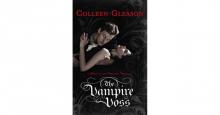 The Vampire Voss
The Vampire Voss Lavender Vows
Lavender Vows Sanctuary of Roses
Sanctuary of Roses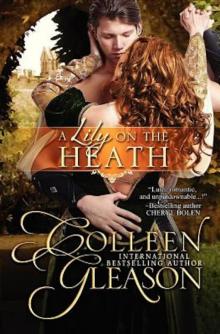 A Lily on the Heath
A Lily on the Heath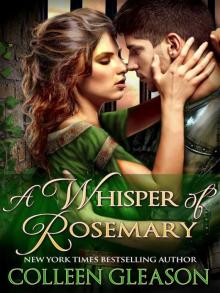 A Whisper Of Rosemary
A Whisper Of Rosemary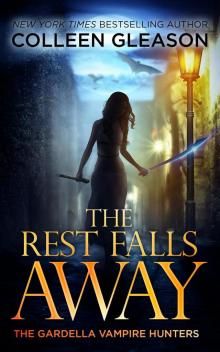 The Rest Falls Away
The Rest Falls Away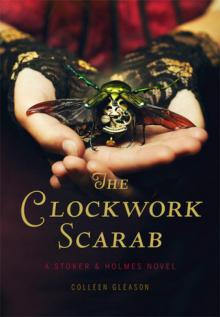 The Clockwork Scarab
The Clockwork Scarab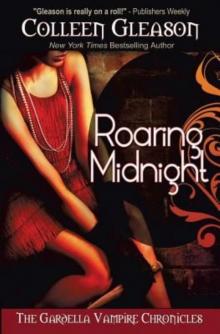 Roaring Midnight
Roaring Midnight The Vampire Dimitri
The Vampire Dimitri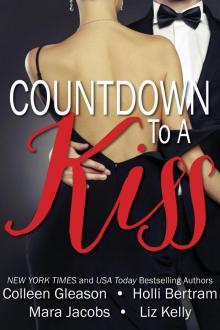 Countdown To A Kiss A New Years Eve Anthology
Countdown To A Kiss A New Years Eve Anthology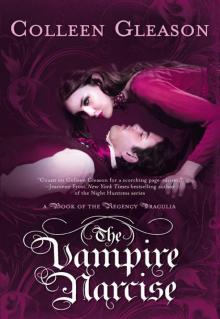 The Vampire Narcise
The Vampire Narcise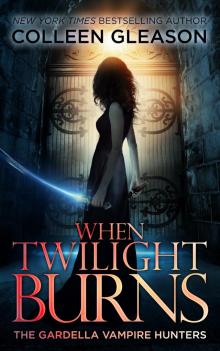 When Twilight Burns
When Twilight Burns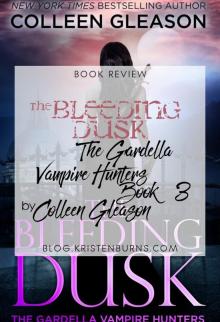 The Bleeding Dusk
The Bleeding Dusk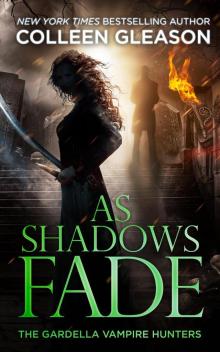 As Shadows Fade
As Shadows Fade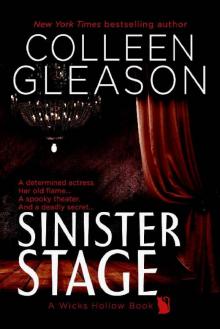 Sinister Stage: A Ghost Story Romance and Mystery (Wicks Hollow Book 5)
Sinister Stage: A Ghost Story Romance and Mystery (Wicks Hollow Book 5)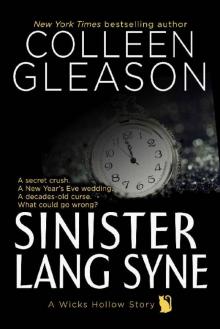 Sinister Lang Syne: A Short Holiday Novel (Wicks Hollow)
Sinister Lang Syne: A Short Holiday Novel (Wicks Hollow) Sinister Sanctuary
Sinister Sanctuary Night Beckons
Night Beckons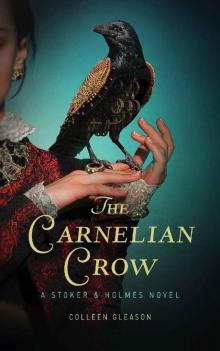 The Carnelian Crow: A Stoker & Holmes Book (Stoker and Holmes 4)
The Carnelian Crow: A Stoker & Holmes Book (Stoker and Holmes 4)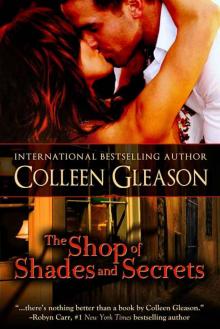 The Shop of Shades and Secrets (Modern Gothic Romance 1)
The Shop of Shades and Secrets (Modern Gothic Romance 1) Lavender Vows tmhg-1
Lavender Vows tmhg-1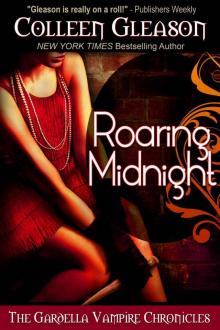 Roaring Midnight (The Gardella Vampire Chronicles | Macey #1)
Roaring Midnight (The Gardella Vampire Chronicles | Macey #1) Lavender Vows (The Medieval Herb Garden Series)
Lavender Vows (The Medieval Herb Garden Series) Dark Secrets: A Paranormal Romance Anthology
Dark Secrets: A Paranormal Romance Anthology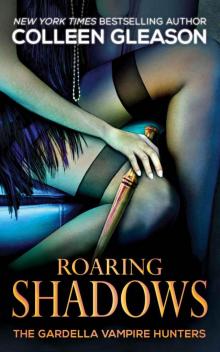 Roaring Shadows
Roaring Shadows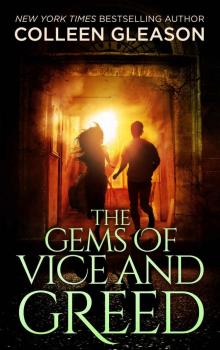 The Gems of Vice and Greed (Contemporary Gothic Romance Book 3)
The Gems of Vice and Greed (Contemporary Gothic Romance Book 3)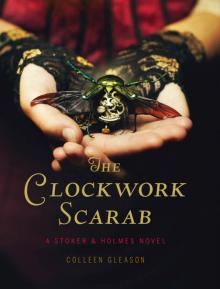 The Clockwork Scarab s&h-1
The Clockwork Scarab s&h-1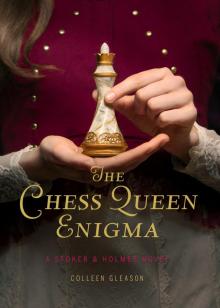 The Chess Queen Enigma
The Chess Queen Enigma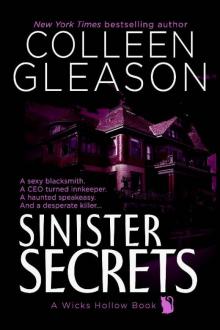 Sinister Secrets
Sinister Secrets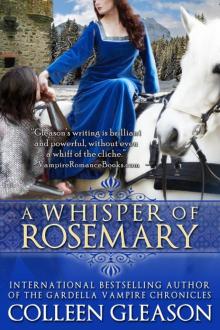 A Whisper of Rosemary (The Medieval Herb Garden Series)
A Whisper of Rosemary (The Medieval Herb Garden Series) Dark and Damaged: Eight Tortured Heroes of Paranormal Romance: Paranormal Romance Boxed Set
Dark and Damaged: Eight Tortured Heroes of Paranormal Romance: Paranormal Romance Boxed Set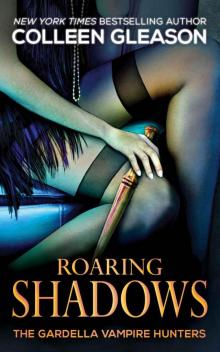 Roaring Shadows: Macey Book 2 (The Gardella Vampire Hunters 8)
Roaring Shadows: Macey Book 2 (The Gardella Vampire Hunters 8)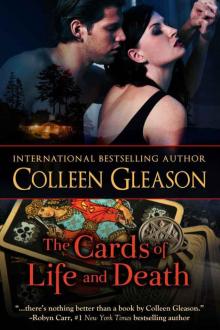 The Cards of Life and Death (Modern Gothic Romance 2)
The Cards of Life and Death (Modern Gothic Romance 2)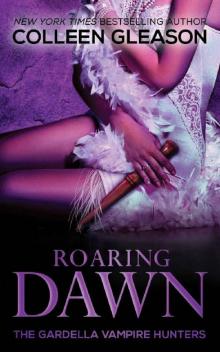 Roaring Dawn: Macey Book 3 (The Gardella Vampire Hunters 10)
Roaring Dawn: Macey Book 3 (The Gardella Vampire Hunters 10)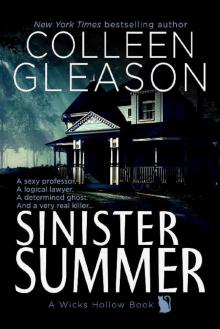 Sinister Summer
Sinister Summer Sinister Sanctuary: A Ghost Story Romance & Mystery (Wicks Hollow Book 4)
Sinister Sanctuary: A Ghost Story Romance & Mystery (Wicks Hollow Book 4)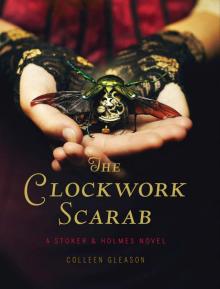 The Clockwork Scarab: A Stoker & Holmes Novel
The Clockwork Scarab: A Stoker & Holmes Novel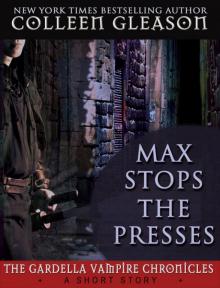 Max Stops the Presses
Max Stops the Presses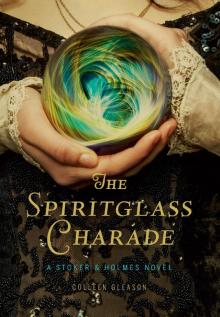 The Spiritglass Charade
The Spiritglass Charade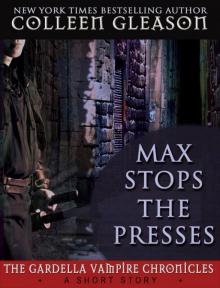 Max Stops the Presses: A Gardella Vampire Chronicles Short Story
Max Stops the Presses: A Gardella Vampire Chronicles Short Story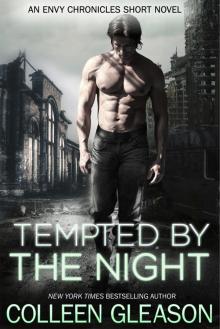 Tempted by the Night
Tempted by the Night